|
|
|
Sort Order |
|
|
|
Items / Page
|
|
|
|
|
|
|
| Srl | Item |
| 1 |
ID:
105375
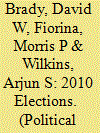

|
|
|
|
|
| Publication |
2011.
|
| Summary/Abstract |
In President Obama's words, the Democratic Party experienced a "shellacking" in the 2010 elections. In particular, the net loss of 63 House seats was the biggest midterm loss suffered by a party since 1938-the largest in the lifetimes of approximately 93% of the American population.
|
|
|
|
|
|
|
|
|
|
|
|
|
|
|
|
| 2 |
ID:
105422
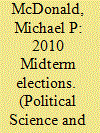

|
|
|
|
|
| Publication |
2011.
|
| Summary/Abstract |
The 2010 midterm elections are consequential not only in terms of the candidates who were elected to office, but also in terms of the government policies that they will enact. High on the list of important policies is the decennial practice of drawing new redistricting plans for legislative offices. A new census reveals population shifts that will result in a reallocation of congressional seats among the states through apportionment and-following U.S. Supreme Court rulings in the 1960s-a re-balancing of congressional and state legislative district populations within states that aims to give fast-growing areas more representation and slow-growing areas less. Of course, much more than an innocuous administrative adjustment occurs during the process of redistricting. The individuals who draw districts are keenly aware that district lines may affect the fortunes of incumbents, political parties, and minority voters' candidates of choice.
|
|
|
|
|
|
|
|
|
|
|
|
|
|
|
|
| 3 |
ID:
105380
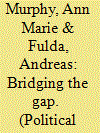

|
|
|
|
|
| Publication |
2011.
|
| Summary/Abstract |
In his seminal work Bridging the Gap: Theory and Practice in Foreign Policy, Alexander George (1993) lamented the great divide between academia and the foreign policymaking community, arguing that greater interaction between scholars and policymakers would produce better policy. We share George's belief that scholars and practitioners each have much to offer the other. In fact, a wide spectrum of opportunities exists for scholars in the field of political science to engage in meaningful public service that can enhance every aspect of their careers, as well as contribute to international understanding.
|
|
|
|
|
|
|
|
|
|
|
|
|
|
|
|
| 4 |
ID:
105425
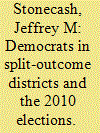

|
|
|
|
|
| Publication |
2011.
|
| Summary/Abstract |
The 2008 congressional elections produced a House in which 84 members came from split-outcome districts. Forty-nine Democrats won in districts that Barack Obama lost, and 35 Republicans won in districts that Obama won. To protect their majority, the Democrats needed to retain these 49 members. Given the party's 257 seats, these split members constituted the difference between being in the majority and the minority. The 49 Democrats faced the dilemma of whether to vote with their party, given that their district voted for the presidential candidate of the other party. The focus here is on these split Democrats: their electoral situation, their votes, and their fate in 2010.
|
|
|
|
|
|
|
|
|
|
|
|
|
|
|
|
| 5 |
ID:
105417


|
|
|
|
|
| Publication |
2011.
|
| Summary/Abstract |
An examination of the results of the recent midterm elections indicates that the new House of Representatives will probably be the most conservative and ideologically polarized House since the end of World War II. Republicans will hold 242 seats after a net gain of 63 seats, constituting the largest Republican majority in the House of Representatives since the 80th Congress (1947-49), which also had 242 Republican members.
|
|
|
|
|
|
|
|
|
|
|
|
|
|
|
|
| 6 |
ID:
105376
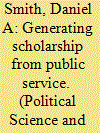

|
|
|
|
|
| Publication |
2011.
|
| Summary/Abstract |
Most colleges and universities stipulate that public service is a requirement for tenure and promotion. Yet many political science faculty and their respective administrators pay only lip service to this "third leg" of a scholarly career, relying on teaching and research to shape most career decisions. This reality is particularly surprising in the context of the political science discipline, given that the nature of our scholarship provides many public service opportunities. However, the norms and pressures of academia in general are at play. Why, then, should political scientists engage in public service, much less become serious "pracademics"?
|
|
|
|
|
|
|
|
|
|
|
|
|
|
|
|
| 7 |
ID:
105374


|
|
|
| 8 |
ID:
105428


|
|
|
|
|
| Publication |
2011.
|
| Summary/Abstract |
How polarized are American political parties? Recently, Kidd used an automated content analysis program to demonstrate that American party platforms reveal only minor policy differences. In contrast to his conclusions, this analysis produces three main findings. First, at the state level, state party platforms reveal considerable ideological differences between the parties. Second, differences in state public opinion do not account for these differences; rather, they are more closely correlated with activist opinions and increases in state party competition. Finally, the conflict is not simply ideological but applies to specific issues in the platforms. As such, American state parties are highly polarized on different measures. Automated content analysis programs clearly represent an important methodological advance in coding political texts, but the results here call attention to the importance of policy and agenda content in party platforms. Moreover, studies of American politics, particularly research focusing on parties and ideological polarization, need to take into account the diversity of agendas that is inherent in a federal party system.
|
|
|
|
|
|
|
|
|
|
|
|
|
|
|
|
| 9 |
ID:
105426


|
|
|
|
|
| Publication |
2011.
|
| Summary/Abstract |
One of the concerns that has plagued research on the biological and genetic underpinnings of social behaviors and individual differences is the fear that such information can be used for ill. This fear rests on a foundation of good reason. Early abuses involving the use of selective phrenology and other purportedly "scientific" methods to establish moral hierarchies among races or between sexes have exerted profound and lasting damage on society, as well as affecting later attempts to more productively examine the biological bases of individual difference. And yet, many policies that have focused exclusively on social factors have created equal pain and suffering, although these approaches have rarely fostered as much discussion. However, despite these negative outcomes, biological research can also attack diseases, alleviate suffering, and dispel social myths that wrongfully assign blame to the victim or otherwise oversimplify behavior. Here, we argue for a similar positive valuation of such an approach in political and social research. We concentrate not on the ethics of conducting this research, but rather the ethical need for this research to be conducted.
|
|
|
|
|
|
|
|
|
|
|
|
|
|
|
|
| 10 |
ID:
105377


|
|
|
|
|
| Publication |
2011.
|
| Summary/Abstract |
Surveys, experiments, large-N datasets and formal models are common instruments in the political scientist's toolkit. In-depth interviews and focus groups play a critical role in helping scholars answer important political questions. In contrast, participant observation techniques are an underused methodological approach. In this article, we argue that participant observation techniques have played and should continue to play a key role in advancing our understanding of political science. After demonstrating the use of these techniques, we offer readers advice for embarking upon participant observation research and explain how this approach should fit into a scholar's long-term career plans.
|
|
|
|
|
|
|
|
|
|
|
|
|
|
|
|
| 11 |
ID:
105378
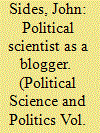

|
|
|
|
|
| Publication |
2011.
|
| Summary/Abstract |
In November 2007, I helped found a blog, The Monkey Cage, with two of my colleagues, David Park and Lee Sigelman. This site joined a nascent political science blogosphere that is now composed of at least 80 blogs (Farrell and Sides 2010). The goals of The Monkey Cage are to publicize political science research and use this research to comment on current events. Although blogging is a promising way for scholars to promote their work to a larger audience, political scientists have been slow to take up this medium. To be sure, blogging is not without its challenges, particularly in terms of the time and energy needed to maintain a site. But blogging can also have its benefits by not only helping political science reach a broader audience, but also aiding individual scholars' research, teaching, and service goals.
|
|
|
|
|
|
|
|
|
|
|
|
|
|
|
|
| 12 |
ID:
105382
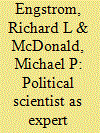

|
|
|
|
|
| Publication |
2011.
|
| Summary/Abstract |
Political scientists serve in courtrooms as expert witnesses on many topics related to their professional training: elections, same-sex marriages, employer sanctions for hiring undocumented aliens, school desegregation, political asylum requests, property rights, and racial profiling, among many others. It is not by chance that we-the authors-have chosen to testify as experts in cases concerning elections (see also Cain 1999). Election-related cases compose a large percentage of all cases involving political scientists brought to court: a study of references to expert testimony by political scientists in published federal district court decisions from 1950 through 1989 reports that 61% involved election law issues (Leigh 1991). Our replication of this study for the period of 2000 through December 18, 2010, reveals that 74% of such cases (28 of 38) involved election law issues. These cases involved issues of minority vote dilution, redistricting, alternative election systems (cumulative and limited voting), campaign financing, voting equipment and invalid ballots, voter registration, nominating petition requirements, and a number of other issues.
|
|
|
|
|
|
|
|
|
|
|
|
|
|
|
|
| 13 |
ID:
105379


|
|
|
|
|
| Publication |
2011.
|
| Summary/Abstract |
During my 45 years as an academic, I have followed the admonition sometimes attributed to the legendary Jedi warrior Obi-Wan Kenobe that political scientists should "use [their] power for good and not for evil." In this spirit, I have devoted substantial portions of my career to public service by providing strategic advice and campaign management to candidates for small state and local elective offices-state legislature, county commission, city clerk or treasurer, school board, and the like-and supporters of citizen ballot initiatives. These campaigns generally cannot afford the professional campaign assistance that is now virtually a necessity for winning elections at all levels of government.
|
|
|
|
|
|
|
|
|
|
|
|
|
|
|
|
| 14 |
ID:
105419
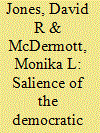

|
|
|
|
|
| Publication |
2011.
|
| Summary/Abstract |
The results of the 2010 congressional elections were indeed historic. The loss of 63 seats by the Democrats was the biggest electoral loss by any party since 1948, making the more recent 1994 and 2006 turnovers pale by comparison. The question that political scientists naturally ask after an event of this magnitude is-why? This article addresses this question by analyzing the role played by the public's attitudes toward Congress.
|
|
|
|
|
|
|
|
|
|
|
|
|
|
|
|
| 15 |
ID:
105421
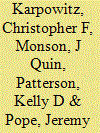

|
|
|
|
|
| Publication |
2011.
|
| Summary/Abstract |
By winning the presidency and strengthening its majority in both chambers of Congress, the 2008 election gave control of the government to the Democratic Party. However, as the 2010 election season unfolded, the news for the Democratic Party could not have been much worse. Economic conditions had not improved dramatically. A bitter and lengthy fight over health care reform signaled to citizens that little had changed in how Washington, DC, governed. The stimulus package and its impact on the federal debt caused unease in a segment of the electorate that was concerned with the size of government. In this context, observers of American politics began to take note of the number of citizens affiliating with, or at least expressing favorability toward, a loose coalition of groups known as the Tea Party movement. Tea Party rallies began to occur throughout the United States, seeking to draw attention to the movement's primary issues.
|
|
|
|
|
|
|
|
|
|
|
|
|
|
|
|
| 16 |
ID:
105423
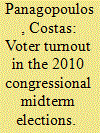

|
|
|
|
|
| Publication |
2011.
|
| Summary/Abstract |
Against the backdrop of the 2008 presidential election, a watershed event in terms of electoral participation, many speculated that renewed interest in voting would spill over into the 2010 cycle, resulting in a meaningful uptick in voter turnout in the midterm elections overall. Turnout was expected to be especially robust among Republicans eager to regain their numbers in 2010, capitalizing on Democratic withdrawal fueled by voters' frustration with President Obama, congressional Democrats, and the struggling economy. In 2008, an electorate energized around an historic contest and unprecedented levels of voter mobilization helped to drive more citizens to the polls on Election Day than ever before (Panagopoulos and Francia 2009). An estimated 131.1 million Americans voted for president, representing 61.6% of the eligible voting population (McDonald 2009). Voter turnout among eligible voters in 2008 was 1.5 percentage points higher than in 2004, when 122.3 million voters participated in the presidential election (Bergan et al. 2005). The 2008 election thus marked the third consecutive presidential election cycle in which voter turnout increased, reversing a trend of declining participation that began in the 1960s (McDonald 2009). In fact, national turnout in recent presidential elections has rivaled modern highs in the level of electoral participation that occurred in the 1950s and 1960s.
|
|
|
|
|
|
|
|
|
|
|
|
|
|
|
|
| 17 |
ID:
105430
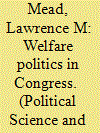

|
|
|
|
|
| Publication |
2011.
|
| Summary/Abstract |
The stakes of political conflict involve contending values and issue definitions as well as policy. Welfare reform was the most important change in American domestic policy since civil rights. Its significance hinges crucially on how participants understood the issue, but existing research fails to resolve what their perceptions were. Most accounts suggest that welfare reform was an ideological contest concerning the proper scope of government, but there are other views. This study gauges the welfare agenda rigorously by coding speakers in congressional hearings on the basis of how they framed the issue and the position they took on it during the six chief episodes of welfare reform that occurred between 1962 and 1996. The reform efforts aroused four distinct divisions. Over time, positions moved rightward, but more important, the dominant issue changed: The ideological debate about government was overtaken by a more practical debate about how to manage welfare. This is the first study to track the substantive meaning of any issue in Congress over an extended period of time using hearing witnesses and a preset analytic scheme.
|
|
|
|
|
|
|
|
|
|
|
|
|
|
|
|
| 18 |
ID:
105429


|
|
|
|
|
| Publication |
2011.
|
| Summary/Abstract |
In only 10 years, Wikipedia has risen from obscurity to become the dominant information source for an entire generation. However, any visitor can edit any page on Wikipedia, which hardly fosters confidence in its accuracy. In this article, I review thousands of Wikipedia articles about candidates, elections, and officeholders to assess both the accuracy and the thoroughness of Wikipedia's coverage. I find that Wikipedia is almost always accurate when a relevant article exists, but errors of omission are extremely frequent. These errors of omission follow a predictable pattern. Wikipedia's political coverage is often very good for recent or prominent topics but is lacking on older or more obscure topics.
|
|
|
|
|
|
|
|
|
|
|
|
|
|
|
|
|
|
|
|
|